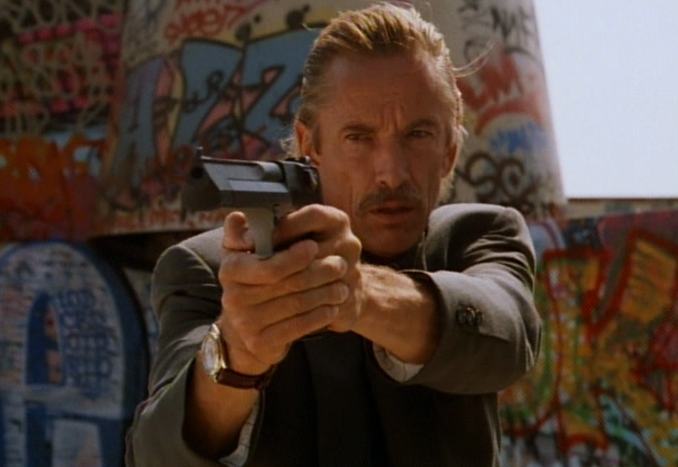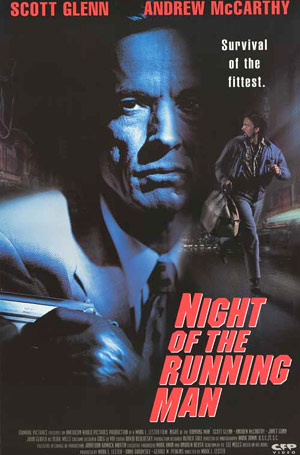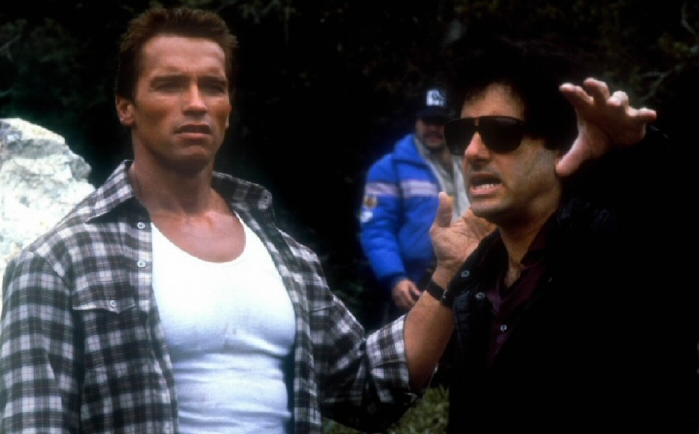
THE FiLMS of
MARK L. LESTER
john cribbs
Mark L. Lester has evolved. His 40-year career began when the drive-in movie was at its most popular, so he went from making award-winning documentaries (about "politics and Buddhism," funny to imagine from the future director of Commando) to churning out crowd-pleasing action pictures that took little money to make and always turned a profit in the B-movie market. His frequent output and business savvy led to jobs directing bigger Hollywood movies
during the 80's at the same time the drive-ins began to make way for multiplexes and mall theaters. Abandoning the safety net of studio backing with OPM, Lester started his own company - American World Pictures - in 1992 and tapped into the lucrative direct-to-video and television market (not to mention foreign sales, which he handles himself through the company.) Still serving as president and CEO, Lester is more prolific than ever, producing 15 movies in the last 10 years, five of which he also directed. Despite
dramatic shifts in production, distribution and audience over the last four decades, Lester is proud to count himself among the few filmmakers to emerge from the drive-in who are still working today.
The one thing that hasn't changed in his career is his love of excess. I wasn't just being poetic in my article on Bobbie Joe and the Outlaw when I said he never lost that drive-in spirit: the impulse to make things bigger, louder and more wonderfully absurd than anything else on the marquee. Even when he strays from the action movies that have defined his career, he brings the same "more is
more" mentality, to the skating movie (Roller Boogie),
political satire (White House Madness), adventure film (TV's Gold of the Amazon Women) and even madcap comedy (Armed and Dangerous). In the past he's shown interest in making a Mother Jones biopic: I'm sure it would be great, but I'd honestly be disappointed unless he cast a gorgeous young supermodel as a scantily-clad labor organizer who arms up and lets her grenades do the talking during "negotiations" with the greedy mill owners, the leader of course being played by a ruthlessly
sadistic Cary-Hiroyuki Tagawa.
Lester was kind enough to take time in the middle of the holiday week, when American World Pictures was busy moving offices no less, to discuss some highlights from his long and successful career.
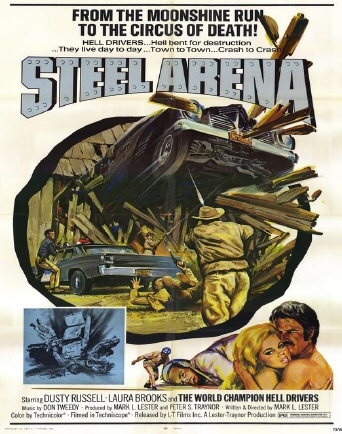
STEEL ARENA
director, 1973.
Hell drivers - hell bent on destruction!
Lester's first feature film was Steel Arena (1973), a movie loaded with scene after scene of eye-popping car wrecks and daredevil stunt work long before the days of Smokey and the Bandit and The Dukes of Hazzard. For Lester, making the transition from somber documentaries to explosive narratives was easy, since the cast was used to doing this kind of thing
in real life.
"I was at the Sacramento River on vacation, just river rafting. I ran into a group of guys there who looked like Hell's Angels. And I said 'What do you do?' They said 'We're the Circus of Death.' They traveled the circuit putting on shows. So I went to some of those and just thought, 'Wow.' Originally I wanted to make it as a documentary, then I realized 'I know all the real people, I'll just write a narrative around it.'"
By turning it into a narrative as opposed to a straight documentary, Lester is able capture not only the death-defying antics but the camaraderie among its wreckless cast, as well as the macho rivalry between movie's hero, former moonshine runner turned daredevil Dusty Russell, and his nemesis "Dangerous" Dan Carter. "It was a slice of Americana that I was trying to create out of that," Lester says. "Later I thought it was kind of a parable
of America. The war in Vietnam was going on, and I thought this was like the gladiators of America - in cars." Rolling Stone Jon Landau's would go on to call it the best original movie made that year.
Filming the Circle's awesome series of divebombs, T-bones, rollover crashes and jumps through fire rings gave Lester his first taste of action scenes that had the potential to go beyond the normal parameters. "All the stunts were filmed at real events. They don't do those shows anymore. The vehicles they used were steel cars from the 60's. The cars today would collapse if they rolled over and crashed like in the movie."
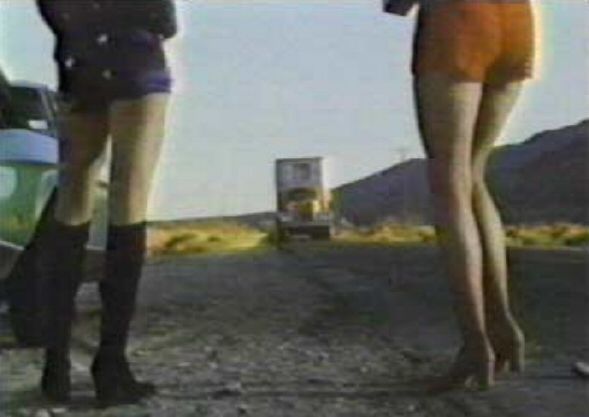
TRUCK STOP WOMEN
mark l. lester, 1974.
Double-clutchin', gear-jammin' mamas who like a lot of hi-jackin' by day, a lot of heavy-truckin' by night!
If Steel Arena was a sampler of wild stunts and explosive action, Truck Stop Women (1974) is a full course meal of gratuitous sex and violence: Russ Meyer with big rigs and hand grenades. Featuring an opening bathtub execution, a full-bodied 18-wheeler taking a plunge off a steep cliff, a police car run over by a semi and a climatic battle among machine gun-toting hookers resulting in a staggering body count - not to mention turncoat Paul Carr
getting trampled by thirty head of cattle in the back of a weaving truck - the movie is wall-to-wall gleeful sleaze.
"My movies were always harking back to exploitation movies of the '40s and '50s. When I made Truck Stop Women, I was thinking of White Heat. When she runs around the cattle truck shooting her gun off in that scene, I was thinking of the scene where James Cagney is shooting off the gun in the trunk of the car."
Claudia Jennings, the exploitation queen from such drive-in classics as 'Gator Bait and Deathsport, plays Rose, a no-bra, no-nonsense chick who, along with her tough mother, runs a brothel for truckers. When the mob tries to horn in on their action, they go to war. Despite being "truck stop women," Jennings and her gang display full-on feminist attitudes and more than stand up to the sexist, bonehead men in the movie who think they can push
them around. Which isn't to say any
kind of subtextual message about women's strength detracts from the glorious white trash melodrama. Of all his movies, Truck Stop Women is Lester's most unapologetically trashy and, by design, the most irresistibly fun.
Lester makes no apologies: "Exploitation movies had a good name. They were filling the drive-ins with Roger Corman films and these kind of pictures were everywhere. You could release those movies and gross more on those than a higher budget art film. A movie like Bobbie Jo and the Outlaw did 5 million dollars at the box office, which at $1, $1.50 admission would translate into a 20 million gross. I was just making films I wanted to make."
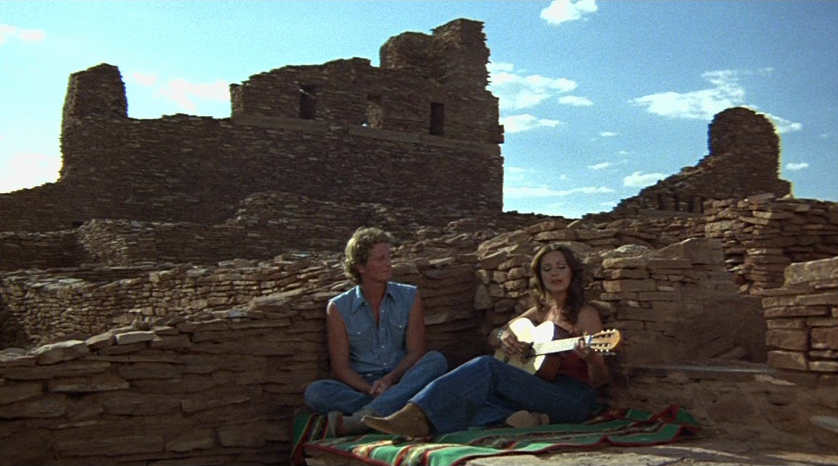
BOBBIE JOE & THE OUTLAW
mark l. lester, 1976.
I wanted to be killed in one hell-firin' minute of smokin' action!
"That movie was very successful," Lester says of Bobbie Joe and the Outlaw (1976). "I did a lot of research on Billy the Kid, and I told the writer to follow the Billy the Kid story. I read about how he had lassoed a safe and tied it to his horse, so in our movie the guy lassoes the safe and ties it to his pick-up truck and crashes through the bank. They travel the same route (as Billy the Kid) in the movie. And the character, I thought,
should just think he's Billy the Kid."
The inspired casting choice for Lester's Billy the Kid was Marjoe Gortner, famous as the subject of the Academy Award-winning documentary that depicted his years as an eight-year-old evangelist. "We were fighting over money with Marjoe, and I told him he had until 5:00 that evening to make his choice. He agreed to do the picture, so I had to tell Sylvester Stallone he didn't get the part." After the movie was released, Lester was surprised to hear he was
being sued by Jay Robert Nash, author of Bloodletters and Badmen, the book Gortner's outlaw uses as a personal reference guide. "It turns out I wasn't allowed to use the book in the movie. I had to pay the author for the rights to the Billy the Kid story. I thought it was public domain at the time!"
Bobbie Jo stands out as one of Lester's most successful and underseen projects. He later paid a great homage to himself when he had Stegman, the evil teenager in Class of 1984, sitting at home watching Lynda Carter bask in the aftermath of a machine gun orgy as Bobbie Jo plays on TV. On the Class of 1984 dvd, Lester makes a quip about his films having a negative impact on the youth of America but I think it's just another juxtaposition to
show
that Stegman has good taste. I've never seen Bobbie Joe on TV myself, but it was finally released on dvd last year as part of MGM's "Archive Collection," joining underappreciated masterworks like John Flynn's The Outfit and Rolling Thunder.
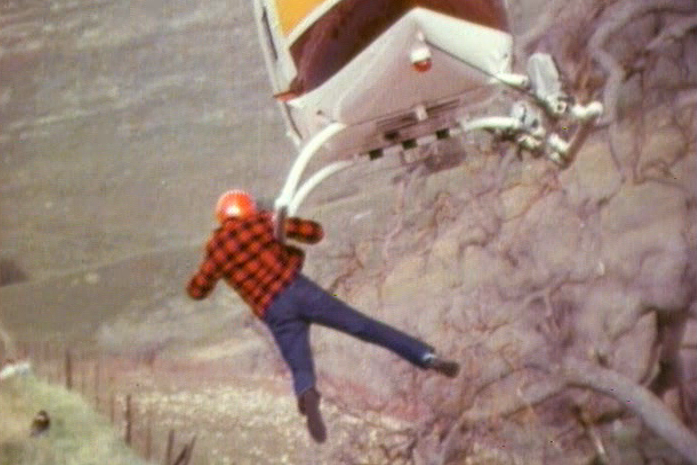
STUNTS
mark l. lester, 1977.
To hell with the dialogue - let's just break something!
1977's Stunts almost seems like a conscious decision by Lester to turn the camera around and show the danger behind some of the crazy stuntwork captured in Steel Arena and Truck Stop Women; an interesting contrast to the portrayal of invincible supermen in his later work, it shows that behind their creation there exists a reality of physical harm and - to some of the more timid stunt performers - an actual fear of it.
But the movie wasn't his idea. "That was Bob Shaye's first movie for New Line Cinema. They were distributing Truck Stop Women to college campuses and they already had a script, so I was hired to direct it." Taking place on the set of a B-movie headed by a sleazy producer and demanding director (after a particularly brutal staged car wreck, the director orders "Nobody move - if he's dead we can't help him!"), the film turns into a thriller
when it turns out somebody is sabotaging the rigging and sending hard-working stunt performers to their death. Robert Forster, who lives by a strict stuntman's code, joins the production to find out who killed his stuntman brother. ("We hired Robert Forster because he had had done Medium Cool. Don Stroud was supposed to star in it but he got into a motorcycle accident the night before shooting.")
Hm...a horror movie about old school stuntmen with a revenge plot and Robert Forster? Could Stunts have possibly influenced anyone in particular? "I talked to Quentin Tarantino recently, and he told me he was really influenced by Class of 1999. Several years ago he had wanted to buy Truck Stop Women for his video label. He was influenced by these films quite heavily, especially the grindhouse movies - those scenes were directly from these
kind of
films."
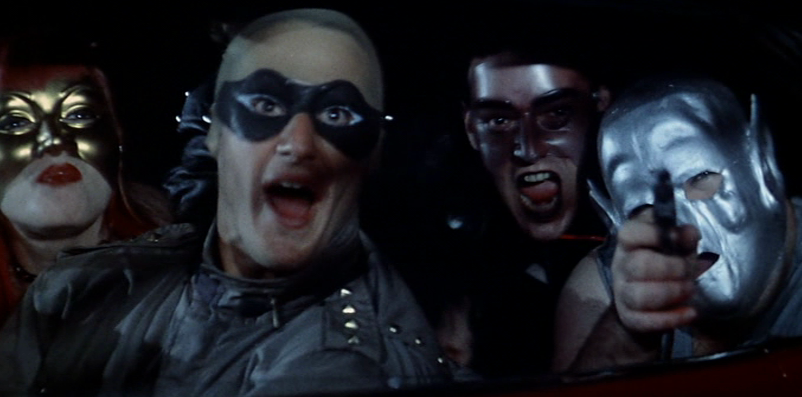
CLASS OF 1984
mark l. lester, 1982.
Is this the future?!
In a high school somewhere in Every Town, USA (actually Toronto), recently-hired teacher Perry King is appalled to find metal detectors installed at the entrances and graffiti all over the walls. Surely it hasn't gotten this bad? Indeed it has, as fellow educator Roddy McDowall insists, and almost before the first bell rings a reckless gang of criminal students have targeted the teacher and plan to make his life a living hell for having the audacity to try and teach
them.
Class of 1984 (1982) has proven to be Lester's most endearing effort, scoring a positive review from Roger Ebert upon release and enjoying a reputation as a cult classic over the last three decades. It's also one of his most frustrating, since it shifts between what seems to be a paranoid-driven exaggeration of "troubled youth," who not only refuse to do their homework but run rampant and kill people, and a realistic social drama that offers
suicide, animal-skinning and the uncomfortable torment and rape of a pregnant woman towards the end of the film. Although its director considers the film "prophetic" in its prediction of escalating school violence, the movie - like his earlier work - is clearly inspired by such exploitation fare as Richard Brooks' The Blackboard Jungle (as well as, Lester points out, A Clockwork Orange) and is given a dose of Lester's signature over-the-top execution. Stegman and his gang are like the
Ultimate Nightmare for conservatives who cross the street when they see a group of punkers coming their way: they're not actually dangerous, just misunderstood, and Class of 1984 is strictly tongue-in-cheek in its portrayal of these problem children. Surely Alice Cooper, who not too long before was promoting youth revolt in songs like "School's Out," can't be seriously condemning bad behavior with lyrics to his opening song like "You've got to learn, it's up to you/if you learn that the
dream just might come true?" Did Lester really intend this movie to be a realistic sign of things to come, as the opening crawl warns? Or is that just in retrospect following the large number of high profile school shootings from the last two decades?
The problem is somewhat cleared up (or made more confusing, depending on how you look at it) by two stand-out scenes. In the first, the rude, aggressively distracting Stegman, played by Timothy Van Patten,* sits down at the piano during his teacher/victim's music class. It seems like he's going to pound the keys irritatingly, but he shocks even the teacher by flawlessly hammering out a complicated piece. After finishing, he inquires with defensive sarcasm whether or
not he can join the class: an offer of peace that, in retrospect, could have sparred everybody a lot of grief. But the teacher refuses, telling Stegman he needs to grow up first. This is one of the few moments where Stegman seems like a real human being rather than a hell-bent felon dealing hardcore drugs, making Nazi salutes and auditioning hookers in his spare time and puts a clear resolution right in front of the stubborn Perry King, who chooses his own dignity over the challenge of actually trying to get
this kid to learn something (he's no Freddy Shoop, is what I'm saying.)
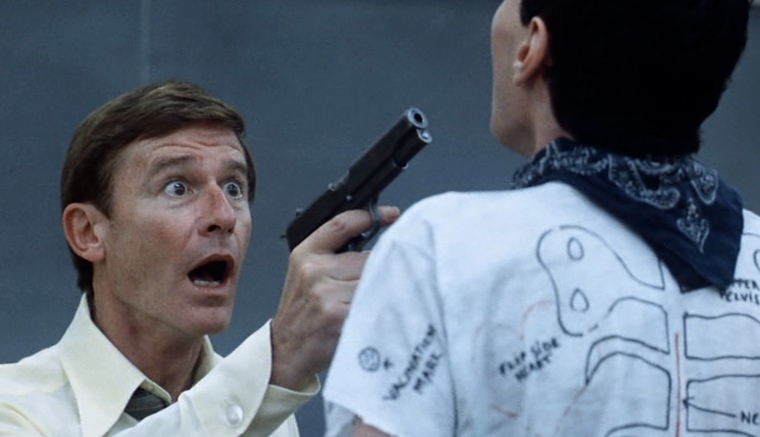
The other, somewhat famous scene is McDowall's breakdown when he pulls a gun on his class in order to force them to pay attention and learn. This may be the best scene in any of Lester's movies: McDowall is great, the scene is genuinely tense and it illustrates what I like to think the movie is about: adults, educators in general, feeling impotent when it comes to relating to the kids of a new generation and taking extreme measures to get them to straighten
up. It stands out so strongly because it's the most believable scene in the film: I don't buy the gang giving prodigal student Michal J. Fox the shiv treatment in the cafeteria just to upset Mr. Norris, but I wouldn't be surprised to hear an actual teacher pulled a gun on his students, or tried to run them over in his car as McDowall attempts later in the movie, in real life. Of course, the irony is that King tells McDowall this is the wrong way to handle the kids only to end up butchering several of them in
the last scene.
Maybe I'm reading too much into what should just be considered a well-made, enjoyable movie. Its finale, which drops the realism entirely to become an all-out bloodbath at the school, is as satisfyingly action-packed and outrageous as anything Lester has done. I'm not saying Class of 1984 doesn't deserve its infamy and accomodations. But if I'm supposed to take most of it seriously, I'm not sure what to think. It's not as obviously the joke that Class of
Nuke
'Em High would be four years later, but there's humor in the movie: the question is, how much of it is intentional? The answer to this and other questions seems to lie with the sequel, which we'll get to in a minute, but for now all I can say is that I was thrown for a loop when Lester told me "Class of 1984 was prophetic in terms of high school violence. I never imagined how disastrous that situation would become over the years. But at the beginning of the film, it does say that it's a warning
to America: that this will be happening everywhere."
Curiously, neither Lester or first-time feature performer Michael J. Fox are billed in the credits with their famous middle initial. "I don't remember why I did that. Although I admit, I thought Van Patten was going to be the big acting star, and it turned out to be Michael J. Fox instead."
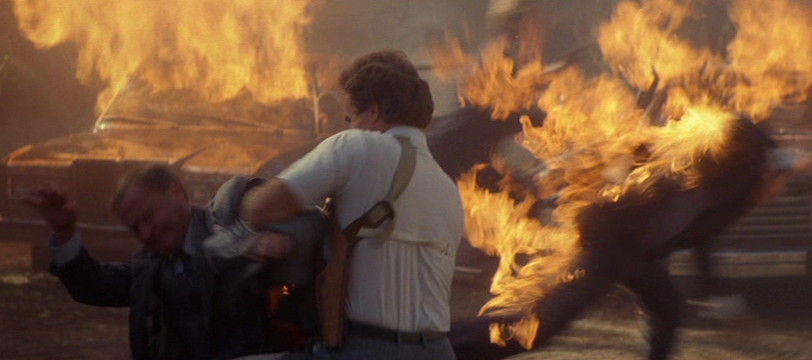
FIRESTARTER
mark l. lester, 1984.
Suppose there is a little girl out there who has within her, lying dormant, the power to someday crack the very planet in two like a china plate in a shooting gallery!
Hot off Class of 1984, Lester was approached by Dino De Laurentiis to adapt a Stephen King property he had optioned, a project which had been abandoned by John Carpenter: 1984's Firestarter. A story packed with King's favorite elements, it follows a father and his pyrokinetic daughter as they flee a secret government organization that covets the power of the girl's ability to set fires with her mind. It wasn't Lester's first foray into horror -
he had produced Tobe Hooper's underrated film The Funhouse in 1981 - but its scale was gigantic even for the action-oriented director. Explosives, fireballs, unsuspecting citizens bursting into flames...there was a lot to cover and as the production schedule swelled, the dangerous effects created a tense atmosphere like a real-life version of Stunts.
"All those effects were done practical on location. There were giant trenches dug in the ground where the fire could move, with this huge fire piping. We actually shot giant fireballs in the air at people!" The pyrotechnics look pretty neat, especially a shot where three Shop agents run in separate directions and the trail of fire splits off to follow each of them - even the lens flare looks amazing. But Lester isn't opposed to the idea of a Firestarter
remake utilizing
new technology. "Today it would probably all be done with CGI. Now it's all seamlessly done, it's amazing. I did a movie called Pterodactyl (2005) after Jurassic Park's pterodactyls and ours looked as good as the Spielberg ones, and they had 10 times the amount of money. You can do amazing things with CGI for not much money. That's another leap forward in the industry. You know, the old days with Ray Harryhausen and the green line on everybody, even when we were kids
we thought that looked stupid."
Watching the movie again recently, I was struck by the close relationship of Andy and Charlie, the father-daughter team played by David Keith and Drew Barrymore. Family units in Lester's movies are usually bound by aberrant behavior (Rose and Anna in Truck Stop Women; the gang in Bobbie Jo and the Outlaw) or torn apart (the murder of Robert Forster's brother in Stunts, the kidnapping of Alyssa Milano in Commando.) Here it's a combination
of those two elements, with both father and daughter exhibiting freaky powers and using them in deadly ways but also being targeted and ultimately separated by an evil government agency. Maybe it's just the dad in me, but I found that the real tragedy of the movie isn't the curse of Charlie's "gift," which like Carrie's telekinesis is used as a symbol of a particularly painful puberty which brings her the unwanted, invasive attention of a bunch of men (most notably George C. Scott's gross, lecherous
agent.) The real tragedy is that Andy and Charlie can't live together as a normal father and daughter, and that their plight is robbing Barrymore's adorable moppet of her childhood (reflections of the actress' real life?) There's a moving shot of the two of them on two different security cam feeds, held in different rooms of The Shop's facility, that reminds me of the famous "lovers apart" shot from L'Atalante. No shit!
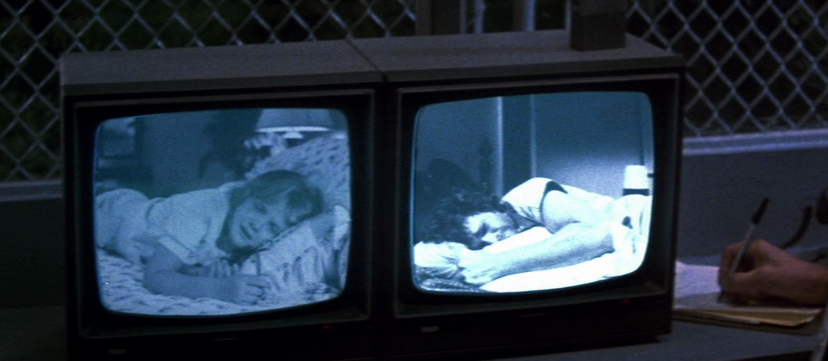
Compared to Class of 1984 and films he'd make over the next several years, what's notable about Firestarter in terms of Lester's work is that it's the little girl who ends up going through the climatic trial by fire (literally.) She's no experienced, unstoppable death machine like Matrix or Dolph Lundgren's Chris Kenner: she's a confused kid who's been used and manipulated by adult males, even her father, and forced into grown-up decisions when all she
wants
to do is be normal. There's something devastating about that too, even though it's pretty thrilling to see her enact her vengeance on the offending parties at the end of the film to the electronic score of Tangerine Dream. When she walks away from the debris, she's become an adult: alone and finally able to make decisions for herself. (I'd recommend ignoring the tacked-on ending where Louise Fletcher is suddenly not terrified of Barrymore anymore and seems to instantly adopt her.)
It's easier to relate to Charlie in this than it is to side with the "teacher who's pushed too far!" in Class of 1984, for example. Although Perry King's Mr. Norris is certainly in the right (he's trying to save his wife), he also represents an oppressive institution just like Matrix (the military) and Kenner (the police department.) And of course, she and Andy represent the little people being hounded by a faceless government agency not too far detached
from reality. "The underlining tone is the CIA and corruption. I got my hands on a book about real experiments that the CIA did with college kids and LSD and hallucinagenic drugs, so that part was true. Dino wanted to make an anti-CIA movie and I guess Firestarter has a lot of that political paranoia about secret agents killing people and stuff."
You can click here to read Eric Pfriender's thoughts on the movie.
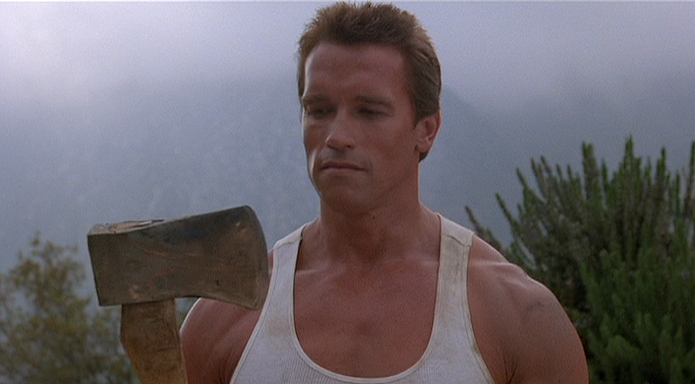
COMMANDO
mark l. lester, 1985.
"What are you expecting?" "World
War Three!"
Like so many wonderful things, this one developed at the Playboy Mansion. "I was in my pajamas at the mansion and Joel Silver was sitting there. He said 'I've got a project, you should come by my office.' I went there and he hired me. He didn't have a script yet, but he said 'We've got Schwarzenegger - we don't need one.'"
Commando (1985) was the first R-rated movie I ever saw, and man what an R-rated movie to start with! Explosions, car chases, Rae Dawn Chong's hair...it was pure sensory overload. The biggest impression on me was the way Lester shoots the character of John Matrix, a Herculean Übermensch who's turned his back on past days of commanding special missions into enemy territory in order to explore his softer side and settle down with daughter Alyssa Milano.
His introduction as he emerges from the forest, with close-ups on his boots and impressive biceps, is something out of Riefenstahl (Lester has said this was done to represent the notion of the invincible man of the earth emerging from the forest.) These images are immediately contrasted with a montage of Matrix feeding a deer, enjoying ice cream and making fun of Boy George with Milano. Reportedly, Schwarzenegger - "a wonderful guy," according to Lester, agreed to play Matrix when he realized it seemed
like "something John Wayne would do."
Like Mr. Norris in Class of 1984 and Charlie in Firestarter, Matrix is forced to go through a trial of fire to reclaim/avenge the loved one who's been taken from him. But if Lester's approach to extreme set pieces has an Odessa Steps scene, it's this one: Matrix putting on war paint, slinging every weapon ever invented over his shoulders and unhesitantly walking into a camp of hundreds of enemy soldiers to take them on all by himself. The epic showdown
has always been a way for Lester's protagonists to prove their self worth and even learn something about themselves. Norris has to show, albeit reluctantly through brute force, that he does have control over his criminal students. In Showdown in Little Toyko, Kenner bests an established swordsman to show that he, an outsider, is more culturally aware and spiritually disciplined than an actual Asian man who has corrupted the honor of his Japanese heritage. In Commando it's no different, although
Matrix isn't just testing his mettle against overwhelming odds to save his daughter: he's demonstrating that he hasn't gotten "soft," as arch-rival and former bush buddy Bennett teases him. The final fight between these two, played out in front of a girl with absurdly large knives, is a test of manhood which Matrix passes by penetrating his foe with a giant tube that releases exhaust as Bennett's life escapes his body. Only then, battle-torn and bleeding, can he emerge triumphantly with the girl in
his arms.
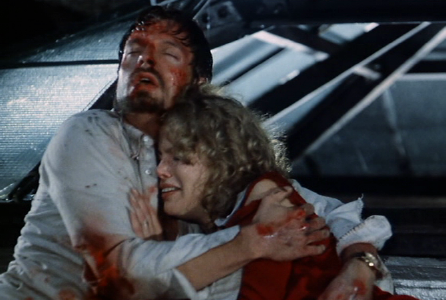
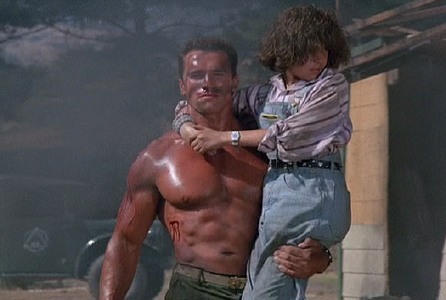
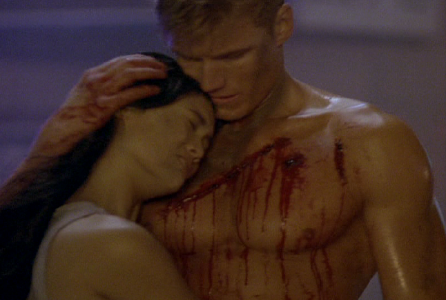
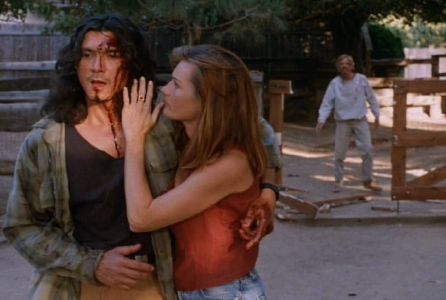
Although the movie is hardly steeped in reality, the application of its extreme violence in the real world recently gave the director pause. "There's a new book that came out about the child African fighters and how they get weapons. And there's a section in there about how they show kids the end of Commando to get them enthusiastic. I thought 'Wow - that's disturbing.' I guess we don't realize the effect our movies have on people." So it turns out
there are kids, like Stegman watching Bobbie Jo and the Outlaw, who glean and admire the violence from American action films, if only in the most corrupted sense as described above. There's never any doubt that Matrix is the good guy: Lester's movies from this era have a clear hero who fights against injustice, whether it be Matrix killing several birds with one stone by saving his daughter, devastating the army of a would-be South American dictator and avenging his fallen teammates from the opening of
the film or Charlie burning The Shop to the ground. Often his characters, like Mr. Norris or Lou Diamond Phillip's Jeff Powers in Extreme Justice, suffer through a moral gray area where they're forced to man up and confront the guilty parties and shut them down for good, making the force on force approach justified through character development.
By all reports, there's a Commando remake on the way. "I was flying back from Cannes, and I was sitting next to the president of Fox Productions. And I told him 'I want to buy the rights to Commando: I'll give you a 2 million dollar check right now.' He said 'Why?' I said 'Well on the internet, there's thousands of fan clubs and people who know every line of the movie. There are so many fans of it - it's huge!' He says 'Call me Monday.' I never got
through to him, but on Monday they announced the remake!" Rumor has it that David Ayer is handling the new movie, and has stated he wants to take more of a "realistic" approach, which sounds suspiciously like the modern filmmaking mentality of taking the fun out of action movies, especially when it comes to the giddy extremes of a movie like Commando. "If they just make it an action movie with no soul or heart then it won't be any good. Some of the remakes are good, but you have to
retain the energy. When I made the movie, I was working from a James Bond angle where there was plenty humor as well. Without the humor, I don't think the picture would work very well."
You can click here to read Paul Cooney's appreciation of Commando.
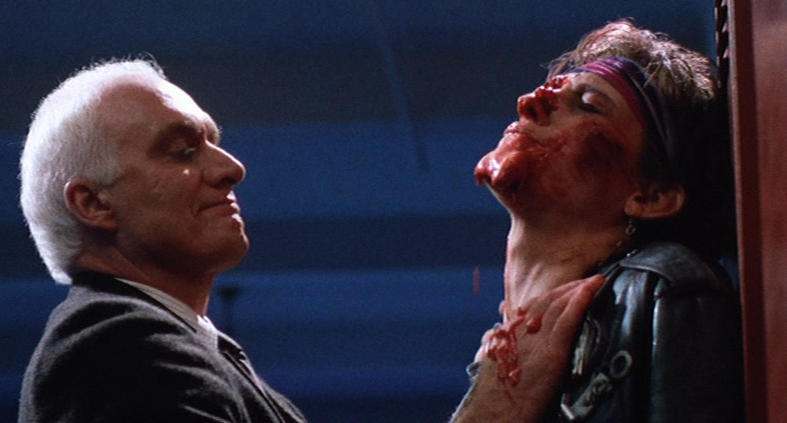
CLASS OF 1999
mark l. lester, 1990.
Whatever happened to education?!
After parodying the kind of action movies he'd been making with the John Candy-Eugene Levy comedy Armed and Dangerous (1986), Lester directed the only sequel of his career, 1990's Class of 1999. Almost like the Roddy McDowall holding-the-class-hostage scene taken to the next extreme level, the movie posits a future where school violence and gang activity has gotten so bad that high schools across America have been sectioned off into "free
fire zones"
to contain the threat of these hedonistic youths spilling out into society. In addition to the metal detectors, schools are fenced off with armed guards like a prison. To control one particularly rotten sector infested with cyberpunk students (in Seattle), the government sends in three android teachers modeled with two functions: "educate" and "discipline."
Going back to my frustration over who we're meant to side with and how serious the "warning" of Class of 1984: this sequel suggests that Lester's aim was satirical from the beginning. The theme of education vs control is taken to the nth degree, and it manages to address both the problem of unruly kids and the ramifications of resorting to ridiculously extreme measures to get them in line (the robots' ultimate solution is to just kill all the students.)
Everything in 1999 is wonderfully overblown and excessive, from how bad the "youth problem" has gotten to Stacy Keach's initiative to activate the punishing battle bots. It's a brilliant concept, an inspired melding of Terminator and Robocop applied to an Escape from New York-esque dystopian society, and is in many ways the ultimate Mark L. Lester movie.
"Originally it was called 'Obediance.' And the idea was how to keep kids in line. Using robots that kill: glad THAT hasn't happened yet!"
Just as the concept is drawn from McDowall's final resort to use force to get his students to listen, the Bradley Gregg character in 1999 represents the idea that criminals can reform themselves, recalling that hint of personality and potential in Stegman when he sits down at the piano in 1984. Extreme measures aren't necessarily the answer, and there's hope that not all kids with weird hair and leather pants are going to skin cats and rape and kidnap
your pregnant wife. Fighting against the evil androids is what brings the warring gangs together: one extreme offsets another. A lot of credit goes to the impressive low budget effects and hilarious performances of the three teachers - especially the great John P. Ryan - but in relation to his other work, this feels like Lester's most notable achievement.
You can click here to read Stu Steimer's thoughts on the movie.
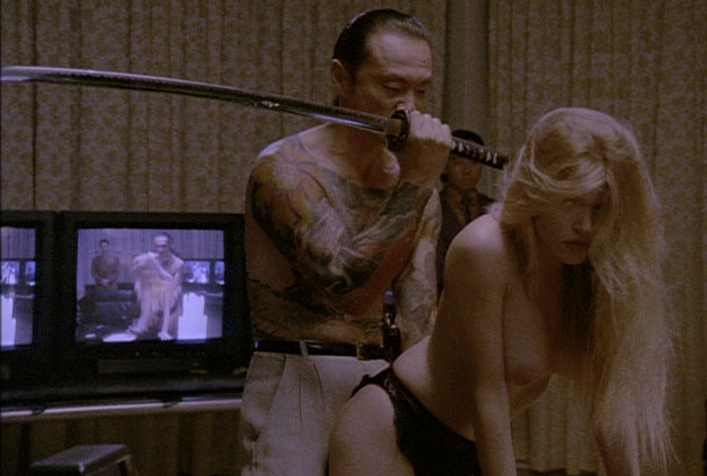
SHOWDOWN IN LITTLE TOKYO
mark l. lester, 1991.
We've got a problem here: there are more bad guys than there are bullets.
Dolph Lundgren's Chris Kenner, star of Showdown in Little Tokyo (1991), is like a John Matrix: he's superhuman. He too lifts a car. And like Matrix he's put-together in his personal life: he's not a wreck like so many of the down-and-out cop clichés from action movies of the era. He's cultured, speaks Japanese, owns a house (as well as a studio apartment safehouse) and is a great dresser. And, apparently, he has the biggest dick Brandon Lee's ever seen.
His astounding masculinity dwarfs the threat of Cary-Hiroyuki Tagawa's yakuza drug lord, who compensates for his impotence by videotaping himself decapitating naked girls with an impossibly long samurai sword: Dolph brings the showdown to this bad guy's "little tokyo."
Showdown is Lester's entry to the "buddy cop" subgenre and showcases plenty of high-octane action set pieces featuring Lundgren and Lee. It follows the Lester formula that, if a gun breaks out, at least 20 people are about to die. Does he have a ballpark figure for the total body count in all his movies? "Oh wow. It has to be in the thousands. I've never counted but that's a good question...
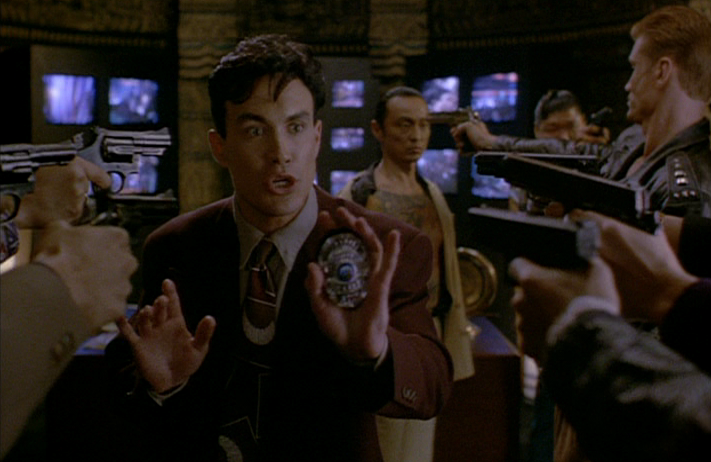
"Are you saying they're violent, these movies, that people die in them? Well nobody died in Roller Boogie!"
I hope Lester knows that was hardly a criticism on my part. But how much does he care about criticial acceptance?
"It's nice to get good reviews. Some of the best reviews I ever got were from Class of 1984 but even they sometimes blasted it. Time magazine gave it a great review, but the Newsweek guy hated it. Roger Ebert gave it a great review. It's nice to see great reviews, but you can't live your life on them. You can't base anything on them. They're really subjective, right? I read rave reviews for films I think are terrible. You can't take it too personally."
EXTREME JUSTICE
mark l. lester, 1993.
Imagine a world where you can draw your gun whenever you want...
Released in the wake of the Rodney King beating and ensuing riots, Extreme Justice (1993), a fictionalized expose of the LAPD's S.I.S. (Special Investigation Section) was a conscious effort on Lester's part to make something grittier and more down-to-earth. "This was all taken from very true incidents that happened. They would wait around until after a crime had been committed, and wouldn't arrest people til later. My favorite scene is where someone
is being raped and they're just waiting in the car until the rape's over, then they move in. That's what they would do: let the criminals rob the bank, then kill them as they left." Despite its grittiness, the movie doesn't disappoint in the extreme department: in the very first scene, the S.I.S. gang (a modern version of Gene Drew's violent deputy death squad in Bobbie Jo and the Outlaw) deal with a liquor store robber...by blowing him away with machine guns! To be fair, the perp did murder the shop
owner in advance, but it's hard not to draw comparisons to Class of 1999's destructive droids. These guys are a bunch of delusional cowboys - Yaphet Kotto's character even wears the hat and vest and shoots from the hip like a self-righteous gunslinger, a get-up that makes him look all the more ridiculous as he's planting a gun into a dead suspect's hand.
Scott Glenn (who would later become a victim of similarly corrupt L.A. cops in Training Day) is the head the rogue squad, and appears to take a sick pleasure in the aforementioned witnessing of the rape taking place, his face betraying ecstasy as he grips his long shotgun while watching from the car. When repulsed new team member Lou Diamond Phillips leaps from his hiding place to stop the brutal crime, Glenn is infuriated. In a scary contrast to Mel Gibson's
suicidal Martin Riggs putting his service revolver in his own mouth in the intense silence of his empty trailer, a drunk Glenn impotently aims his gun at a picture of an apparent ex-girlfriend and fantasizes god knows what. In this world, justice isn't for the victims, it's an excuse for the unethical law enforcement to get their cheap thrills and satisfy their violent tendencies.
In that regard, Extreme Justice also seems almost like a response to the movies Lester had made over the last 10 years. Since it came right after Showdown, it's hard to think about the scene where Brandon Lee smirks as he lights an unarmed bad guy on fire and not think 'Woah - LD Phillips would not be cool with that!' ("I wouldn't connect the two," Lester dismisses.) Especially since it's another movie about partners (and that Scott Glenn scene really
does seem to purposely evoke Lethal Weapon), it appears to condemn not only the characters of this film but any sidekick who would endorse the hero's violent behavior by enabling him to practice his vigilante-like tactics unremittingly. It's also got a lot to do with the Class of- movies: the squad's violent solution to controlling the crime problem, as if every criminal was equally guilty and there was no level of wrongdoing. By allowing the disturbing rape scene to play out, the cops are just
as complicit as Stegman and his crew. Even as Lou Diamond Phillips questions whether this approach is acceptable as long as crooks are being put down, Lester seems to be commenting on the "extreme justice" explored in Commando or Showdown. He made the movie more difficult for the audience to root for the characters, intentionally blurring the line "so some people can watch it and say 'they're doing a really good thing' while others can say 'they're really not.'"
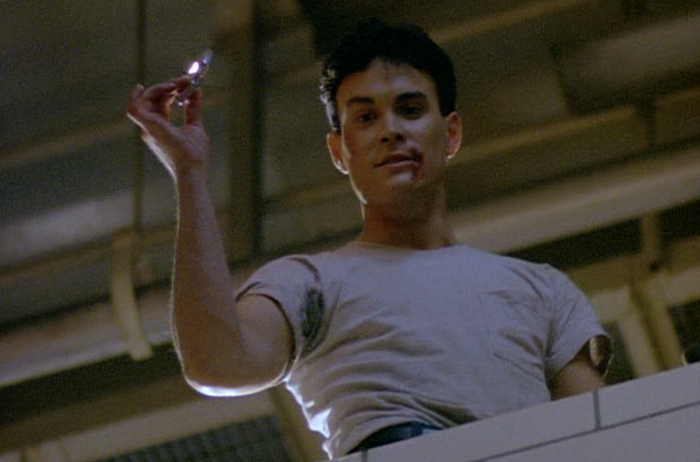
Even if Lester wasn't making a conscious change in the sort of movies he directed at this time, his method of distribution changed with Extreme Justice, which premiered on HBO before being released onto video. "There was a shift in distribution at that moment, because it was meant to be a theatrical film. But that was a moment in time where direct-to-video had just come in. Distributers saw they could make a lot of money on vhs or on paid-for-tv premieres
and not have to spend the money on theaters. So that was a big shift in distribution where medium-sized movies wouldn't be released in theaters anymore. 2, 3 million dollar movies were making money going straight to the video market as opposed to spending 20 to 25 million for theatrical release."
NIGHT OF THE RUNNING MAN
mark l. lester, 1995.
Survival of the fittest.
Night of the Running Man (1995) was the first film made for Lester's new company, American World Pictures. "After Showdown in Little Tokyo, I wanted control of my movies because it was finally taken over and edited by the studio and I wanted to have more control over my own movies. At that year's Cannes Film Festival, Lion's Gate was just starting up
and they needed movies so I took a 10 picture order from them. I directed all 10 films. Those included The Ex, Misbegotten, The Base...they were all done with Lion's Gate. So at that time I set up a foreign sales company to sell them internationally. I realized I needed more movies from other people, so it became a full-fledged distribution company. It came about by me wanting to make my own films and distribute them, so I could make the kind of films I wanted and have financial backing
from my own company. I recommend that to anyone starting out - it's a really good plan. If you can distribute your own films, it's a good way to get them watched."
Just as Lester's business scheme changed, so did the kind of movies he was making. In Night of the Running Man, cabbie Andrew McCarthy is a different kind of Mark L. Lester hero: he's hardly invulnerable, he's not a man of action - in the first scene, he notices a bum dressed just like him and is visibly disturbed: he recognizes the slippery slope to nowhere he himself is on. He's not put together like a Matrix or Chris Kenner, but he experiences a different
kind of trial by fire when he runs afoul of the movie's real badass, Scott Glenn's slick but sadistic hitman. It's a logical extension of Glenn's Extreme Justice character: he dresses well, has lots of resources around town and can take down any threat, making him superior to those around him. But at the same time he can't help murdering a helpless woman after sex: he's got the same weird perversion and lapse of moral character as Cary-Hiroyuki Tagawa in Showdown in Little Tokyo. But when he
comes
after McCarthy - trying to escape with ill-gotten mob money - the weak cabbie involuntarily enters Glenn's world and has to become a self-reliant badass himself to survive. After being hobbled by having his feet boiled during a nasty torture session, he's forced to stop running and stand up for himself.
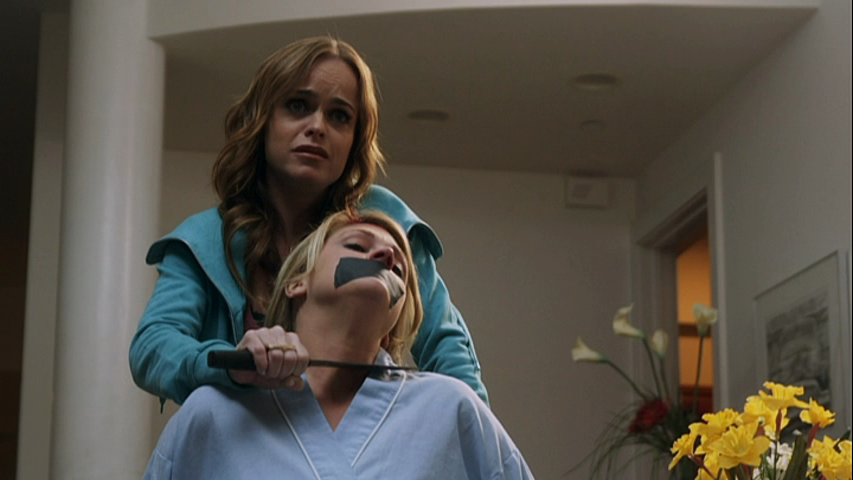
THE EX
mark l. lester, 1997.
MISBEGOTTN
mark l. lester, 1998.
Now the evil begins!
Following 1996's direct-to-video period picture Public Enemies, a Ma Barker movie that reunited Lester with a grown-up Alyssa Milano, he directed two scripts by the great Larry Cohen: The Ex (1997) and Misbegotten (1998). "I love those movies. Larry Cohen's a great writer and those were really well-written scripts. The Ex is one of my favorite movies I've made because it has a real European sensibility: really good characters
and the scenes between the characters are really well developed. It's an exciting movie and there's lots of suspense. Same with Misbegotten. We both have that same sensibility of exploitation."
The two filmmakers make a good combo: Cohen with his over-the-top approach to concept, Lester with his over-the-top execution. In The Ex, the Mark L. Lester extreme (the title could even double as an abbreviation for "The Extreme") is applied to the psycho: she's capable of manipulating everyone around her, but is also unbelievably strong physically and can literally dominate men. At the beginning, she kills a guy she's just seduced in a hotel
bath then gloats over his corpse: "You're a sissy!" The scene recalls the opening bathtub murder in Truck Stop Women, which makes sense since something Lester's later films have in common with his earlier work is less of an emphasis on the indestructible superman and more attention given to strong female characters (albeit some psychos.) Even though Deidre Kenyon (The Ex), Jayne Ferre (Lady Jayne Killer), Solange (White Rush), Riley Simmons (Groupie) are killers, they
have the same kind of independent strength as Rose in Truck Stop Women or Bobbie Jo Baker (you could also include Roller Boogie's Terry Barkley and Firestarter's Charlie McGee - there's also that scene in Stunts where bereaved stuntwoman Joanna Cassidy kicks ass in a bar.)
Both movies involve falsely-created family ties: the female psycho who still has a hold on her husband and the male psycho who feels entitled to the child he fathered through sperm donation. So it has that theme in common with Commando and Firestarter: the family torn apart that has to be protected and reclaimed, even though the invading individual believes they're the entitled party. Just like in Love
Songs, Nick Mancuso plays the husband in both films and he's the highlight of each. In The Ex, he repulses the advances of his former partner even though the rough sex they enjoyed during their kinky marriage begins to seep into the bedroom, much to the shock of his boring, chaste wife Suzy Amis (wow, remember her?) In Misbegotten, he's allowed gorgeous wife Lysette Anthony's choice to go with artificial insemination to demolish his ego and leave him a bitter, insecure wreck. Although
the movies focus on their crazy stalkers, Mancuso becomes the Mark L. Lester hero, forced to face his past mistakes and shortcomings and go through a physical and psychological gauntlet to earn their role as head of the family.
The Cohen collaborations were the start of a series of suspense films directed by Lester with increasingly crazy scenarios: 2000's Blowback (a religious serial killer hired to be an assassin by a secret government agency who helps fake his death, only to end up being pursued by the cop who brought him down in the first place), 2000's Sacrifice (a prisoner escapes from jail to avenge the death of his daughter, murdered by a serial killer) and, possibly
his wildest yet, 2003's
Stealing Candy: three ex-cons kidnap a movie star and force her to do a sex scene in a scam to get rich through pay-per-view (the story is credited to Lester and his wife, producer and American World Pictures president of production Dana Dubovsky.) His latest directorial effort, Groupie (2010), sees him coming full circle from the days of The Ex with another stalker film that comes up with a weird twist on the old formula (Taryn Manning even drowns a victim in tribute to Yancy Butler's choice
of murder.) Lester's filmography currently boasts 30 directing credits over 40 years in an industry that's constantly changing and, like so many of his protagonists, he's proven himself to be a survivor.
"When I started, there were 5,000 drive-ins in America. Now there are five drive-ins left in the United States, as kind of historical sites. So it's gone all the way from that, where there's only theatrical films and three networks - over 40 years there's now dozens and dozens and dozens of networks all over the world. In the United States, there's over 100 channels. And then there's the internet. So there's a whole shift in distribution and so many movies being
made. There were 125 movies made the year I made my first picture. Now there are 5,000 movies submitted to Sundance alone. So the technology has been unbelievably democratized as far as making a movie. You can shoot a movie for any price with modern equipment. They can post it on the internet, or get it distributed, so there's a lot more product, a lot more competition and many more audiences now."
~ 2011 ~
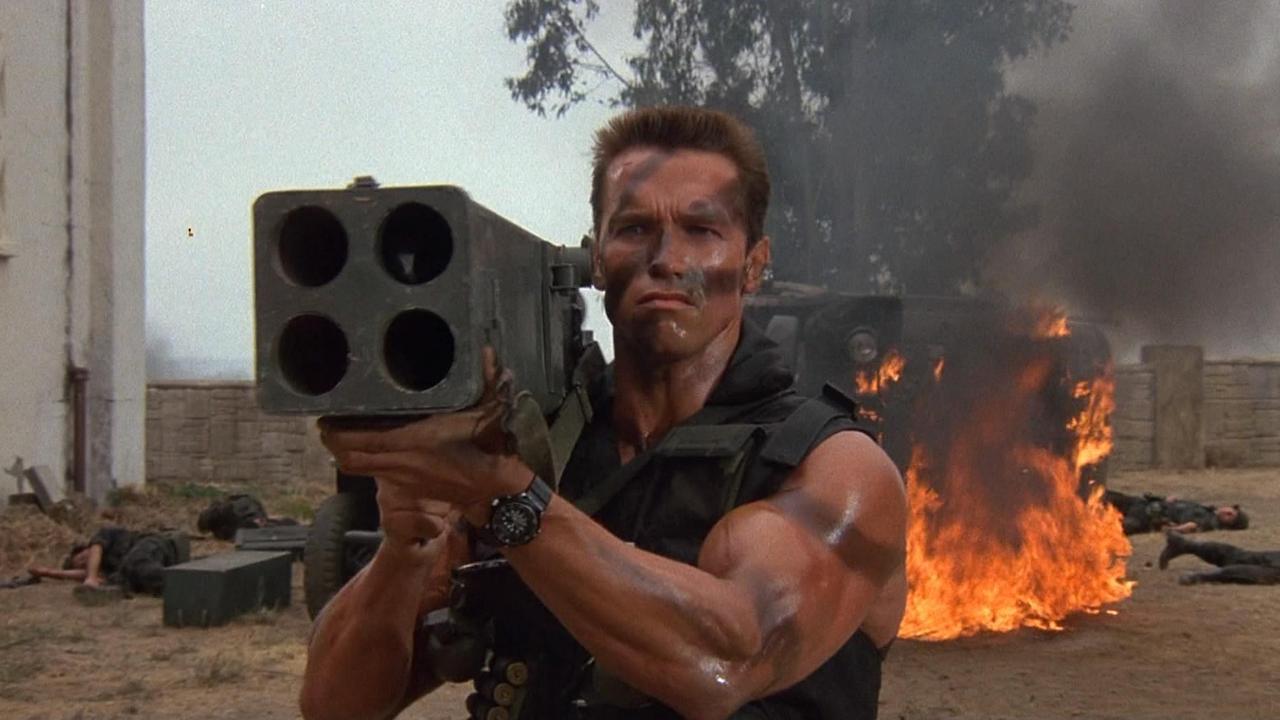
* Funnily enough, Van Patten went on to direct episodes of The Wire, a show that would also tackle the problem with educating problem kids who have no respect for the school system or society in general.


















